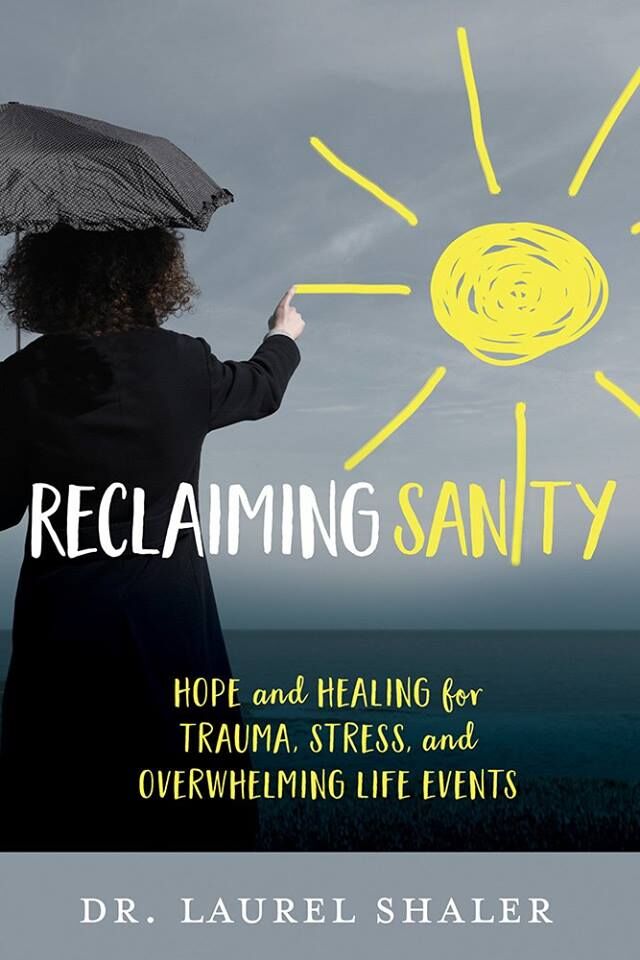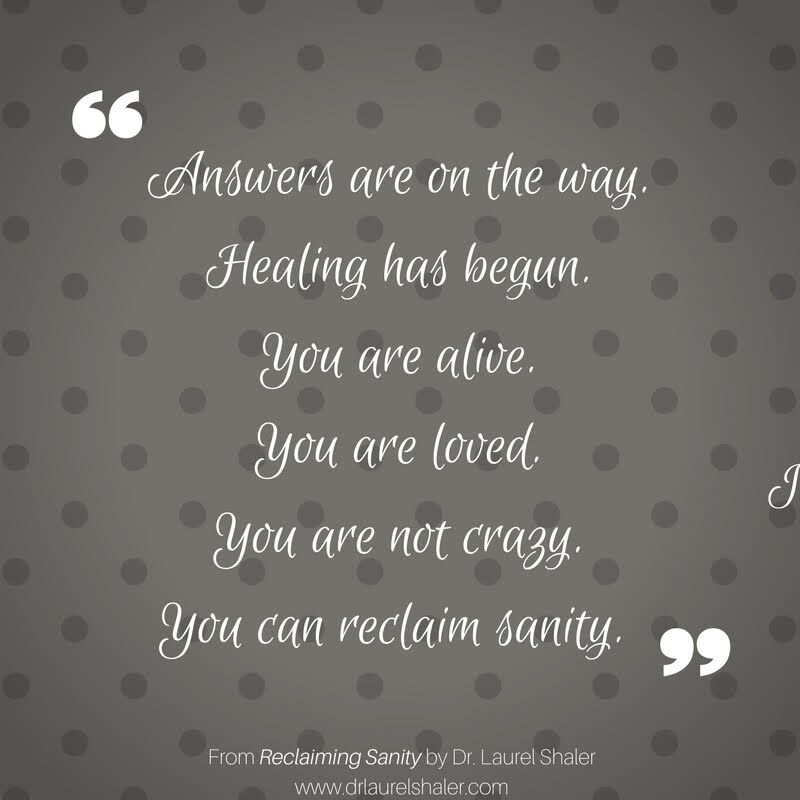I read fiction—a boatload of it. Mostly because I learn so well through story but also because I need that escape. However, what many people don’t know is that I also love a good non-fiction book. I love self-help, theological books on points of doctrine, historical memoirs and explorations—the works.
But when it comes to books to review, I almost exclusively choose fiction. Because of this, I have given my friend at Celebrate Lit permission to choose non-fiction books she thinks I should read.
Not too long ago, I chose one. By the title alone. I didn’t know what it was about—didn’t even bother to read it. There was just something about that title— Reclaiming Sanity. I mean, who wouldn’t want to find out what that was about?
Of course, when I got it and discovered it was written by a psychologist/psychiatrist, I winced. I tend not to be a big fan of what is often just “psychobabble” without Biblical context. Still, I couldn’t help but be intrigued. Who wouldn’t want their sanity back if there was hope, right?

Note: links may be affiliate links that provide me with a small commission at no extra expense to you. Additionally, I requested a review copy and chose to purchase one for myself.
How to Reclaim Sanity & Start the New Year off Right
The answer? Easy. Read Reclaiming Sanity.
Look, I didn’t know what to expect with this book, but I was determined to get something out of it.
Oh, me of little faith.
Dr. Shaler writes a straightforward, compassionate book for anyone dealing with past or present trauma in his or her life. I’ve had some pretty traumatic things happen to me, but I’ve never been diagnosed with PTSD, and from her examples of what you might experience if you were someone dealing with that disorder, I don’t fit the criteria at all.
But I can see that Reclaiming Sanity has a lot of information that would help anyone who lives in this fallen world. And it’s not chock-full of psychobabble.
What it does have is Scripture applied where appropriate. Not once did I feel like it was “stretched to fit” the situation in that obnoxious “proof-texting” way that many authors are tempted to do. Hey, I tend to do it with myself sometimes, so this was particularly awesome.
While I did disagree with her use of one Scripture, it’s one universally misapplied (in my opinion and understanding) by people everywhere. You see it plastered on journals, t-shirts, and wall plaques. I kind of can’t complain about it, you know? And even though it is misapplied and stretched, it doesn’t mean that the words aren’t true. It just means it isn’t a “promise” to us specifically as we tend to treat it.
I digress.
Like most non-fiction books, the middle part is the BEST.
Have you ever noticed that? In fiction, if an author isn’t careful, the middle of the book can drag and be boring, but with non-fiction, it’s like authors do the old college essay format.
- This is what I’m going to teach you.
- I teach you.
- This is what I taught you.
That middle part just seems to have the most meat in all of my favorite non-fiction books. This one is no different.
In fact, the middle part of this book is so good that I will be recommending it to everyone I know.
It deals with anger and it’s a brilliant look at it. Biblical, straightforward, compassionate, but packs a punch, this section has workbook-style questions and really digs into anger. It shows how destructive anger is, how you can address it, and the truths and lies we tell ourselves about it.
And when you consider how PTSD holds hands with anger (understandably so), learning to deal with it is an important part of the healing process.
Reconciliation is also a part of the middle of Reclaiming Sanity, and it’s beautiful.
One of the most impactful things I read had to do with a story about a woman’s relationship with a previously abusive mother. I loved how Dr. Shaler showed that reconciliation for this woman included spending some time with her mother, but setting boundaries that are both Biblical and health-giving. It was one of the few times I’ve ever seen someone talk about boundaries as a means of improving a relationship instead of protecting self alone.
The last third of the book—equally strong.
Unlike that “old college try,” this section also has quite a bit of helpful information for anyone, but it does go back to the more traumatic situations.
Dr. Shaler takes the time to show you how to create your own “mini retreat” for the purpose of walking through these issues and “reclaiming sanity” in the process. I expected to find this section more fluffy, but it wasn’t. The advice is solid, helpful, and yet not overwhelming in intensity.
What will you find in the pages of Reclaiming Sanity?
Common sense, for one. Spiritual encouragement and mentoring. Realistic psychological help rooted in the truths of Scripture.
And stories. You know how I love my stories. Dr. Shaler uses actual cases (and sometimes composite ones) to illustrate what she means. Not once did I feel like I was getting one of those cheesy “created-for-illustrative-purposes” stories. Instead, I found myself wanting to pray for the people involved.
That’s a pretty good feeling.
Recommended for people who have endured trauma that still affects their ability to cope with life. Also, if you have any anger problems at all, this book right here—so awesome. I can attest that many of the things she talks about are what I did the day I realized I was getting upset and yelling at my kids when I didn’t like or want to be that person. I was able to stop it. Cold. And I think Reclaiming Sanity would help others gain control as well.
Look, when I got my review copy, it came as a PDF. I was fine with that, but I wasn’t once I started reading… not so fine. I immediately went and dropped a paperback in my Amazon cart. This is one I want to own. I’ve no doubt that I’ll be sharing it. Often. And yes, I’m off to read her next book, too. Because I must (name that movie reference!).
And… as of the writing of this review, Reclaiming Sanity is just .99! Grab it while you can!
 About the Book
About the Book
With a girlfriend’s companionship and a professional counselor’s expertise, Dr. Laurel Shaler walks you through personal stories and biblical insights that shed light on daily and traumatic stress. In Reclaiming Sanity, she shows
- How to find freedom from the past
- Five myths about anger and how to overcome them
- The antidote for nagging worry and sleepless nights
- Ways to rebuild trust in others
- How Christ gives true strength. Offering effective action steps toward reclaiming sanity, Dr. Shaler guides you through the healing process, whether you are dealing with a one-time traumatic event or years of hidden pain.



Leave a Reply